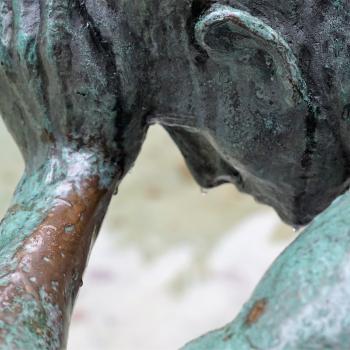Normal days beg no explanations. Daily life asks no questions that the newspapers, Internet, or personal opinions cannot answer.
But natural disasters – earthquakes, tsunamis, hurricanes, tornadoes – these demand justification.
On November 1, 1755, a massive earthquake hit Lisbon, Portugal. Modern geologists estimate it was nearly 9.0-magnitude on the Richter scale. It was 9:20 in the morning on All Saints’ Day, a central Catholic holiday, and many were at Mass. Nearly all the major churches of the city were leveled, and the faithful were crushed. Many who ran to the ports in an effort to escape the falling buildings watched with curiosity as the ocean seemed to be sucked out into some faraway deep-sea abyss, leaving a debris-ridden field of mud, and then rushed back with a horror that obliterated many who had survived the earthquake. Between the quake, the tsunami, and the raging fire that followed, the city was nearly completely destroyed, and upward of 100,000 people were killed.
This was inexplicable to the pundits of the day, that day being in the heart of the Enlightenment era. Rationalism, the lifeblood of the Enlightenment, could make no sense of a God who would cause or even permit an earthquake that would have so pointedly decimated His own people.
Worse yet, some priests who were associated with the Inquisition decided that surely such a tragedy must be the judgment of God on the sins of the people. They contributed to the victim count by identifying supposed heretics and hanging them or burning them at the stake – amidst the ruins of their own cathedrals.
Clearly, Voltaire argued, there is no God out there paying attention. Any God worth His salt could take better care of His own. The earthquake proved what Voltaire, and others, suspected all along – that God, if there were such a being, was busy somewhere else and could care less about what was going on in our puny lives. We are on our own.
And for the most part, Voltaire preferred it that way, and so do we. We want to be on our own as we choose our pleasures, determine our careers, construct our politics, and negotiate our own business. God is for God-stuff, like natural disasters, or wars, or maybe personal catastrophes, but certainly not for daily bread. What’s the point in asking Him for what I can get or do for myself? And besides, a calloused God who can’t be bothered to lift a finger to prevent an earthquake that kills thousands upon thousands – whether in Lisbon in 1755 or Haiti in 2010 – can’t be relied upon to pay much attention to the fleeting events of my day-to-day life.
Is that right? Is that the sum total of the doctrine of divine providence? A feeling of abandonment that we enjoy most of the time and bewail when we’ve been cornered by deprivation or disaster?
Any explanation of unwarranted suffering is inadequate. Even Christ himself was gripped with the horror of forsakenness in the throes of his suffering. It was only his day-in and day-out reliance on God, developed through years of habitual prayer, worship, and obedience, that enabled him, in that confrontation with the inexplicably cruel hand of God, to say, “Into your hands I commit my spirit,” and to trust that the incomprehensible was indeed well within the scope of God’s plan and purpose.
Perhaps we pray for daily bread and receive it with gratitude as an act of divine providence so that if it is taken away, we know that the absence of bread is not the absence of God.













